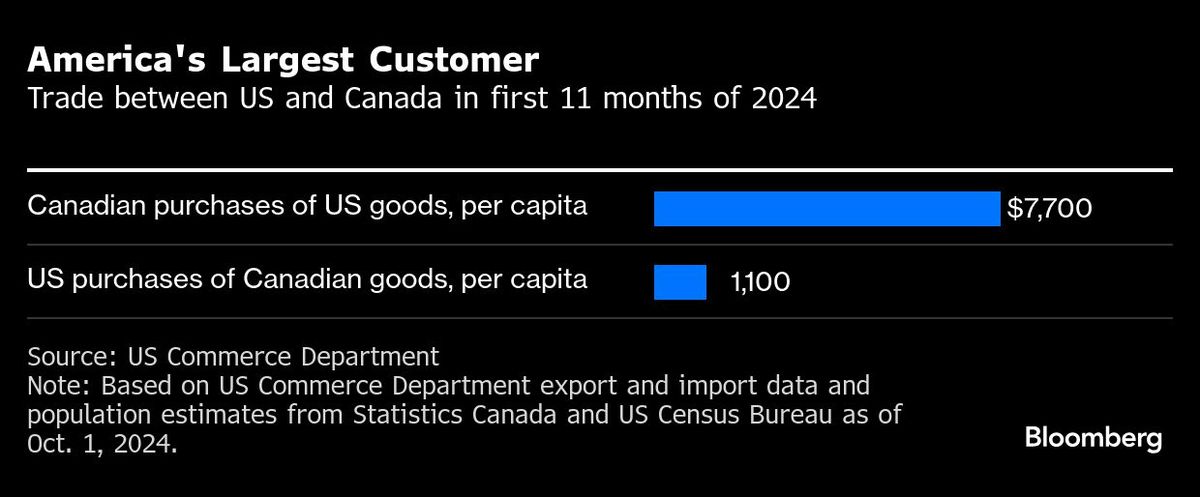
(Jan 13): Justin Trudeau says Canada is ready to respond with counter-tariffs against the US if President-elect Donald Trump follows through on his threat to begin a trade war in North America.
Speaking on MSNBC’s Inside With Jen Psaki, the outgoing Canadian prime minister said his government isn’t looking for a trade fight with the new administration but will have to retaliate if the US puts tariffs on Canadian products.
Canada buys more US-made goods than any other country, according to US Commerce Department export data — about US$320 billion (RM1.44 trillion) in the first 11 months of last year. The US trade deficit on goods with Canada was US$55 billion during that period.
“As we did last time, we are ready to respond with tariffs as necessary,” Trudeau said. “We are the number one export partner of about 35 different US states and anything that thickens the border between us ends up costing American citizens and American jobs.” On a per-capita basis, Canada buys far more from the US than the US buys from Canada.
When the first Trump administration placed tariffs on steel and aluminium in 2018, the Canadian government put levies on a list of US-manufactured items that included household appliances, bourbon whiskey and boats.
This time, Trump has said he’s considering broad 25% tariffs against items from Mexico and Canada. One draft retaliation plan circulating within the Canadian government would affect almost every category of products imported by Canada from the US, Bloomberg reported on Jan 10.
In the interview with Psaki, Trudeau touted Canada’s decision to spend more on border security, including more helicopters and drones, which aims to stymie the flow of fentanyl and illegal migration into the US — a direct response to Trump’s concerns.
“Less than 1% of the illegal migrants, less than 1% of the fentanyl that comes into the United States, comes from Canada. So we’re not a problem,” Trudeau said. “We’ve actually responded to his request for us to do more with billions of dollars worth of investments to even further strengthen the security of our borders.”
Trudeau called Trump’s taunts about making Canada the 51st US state “distracting” from more pressing issues.
Trudeau, who said Jan 6 he’ll resign as prime minister and Liberal Party leader, will remain in the country’s highest political office until members of his party choose his successor on March 9.
Meanwhile, a prominent conservative provincial leader engaged with Trump on Saturday. Alberta Premier Danielle Smith said she met the president-elect at his Mar-a-Lago residence in Florida to emphasise the importance of US-Canadian energy relationship.
More than half of US crude imports come from Canada, most of it from Alberta. Asked whether Canada could curb energy supplies to the US, Foreign Affairs Minister Mélanie Joly told CTV News: “Everything is on the table.” Smith has said she’s opposed to energy export restrictions.
Ontario Premier Doug Ford in December floated the idea of cutting off his province’s electricity exports to several border states, but last week he proposed a new energy partnership that would deliver more nuclear power to the US.
Canada’s provincial premiers plan to visit Washington in February to warn of the harm tariffs would cause to both countries.
Trudeau, 53, has served as prime minister for nine years. His approval rating dropped below 30% last year, according to public opinion tracking by the Angus Reid Institute. Then came Finance Minister Chrystia Freeland’s December resignation in which she said the government needed to avoid “costly political gimmicks” and keep its financial capacity ready to deal with the impacts of a possible trade war.
Her exit led to an uprising of Liberal members of parliament calling on Trudeau to quit.
The winner of the party’s leadership contest will become Canada’s 24th prime minister. A national election is due by October, and may come sooner if opposition parties join forces in a non-confidence vote to topple the government.
Uploaded by Chng Shear Lane

